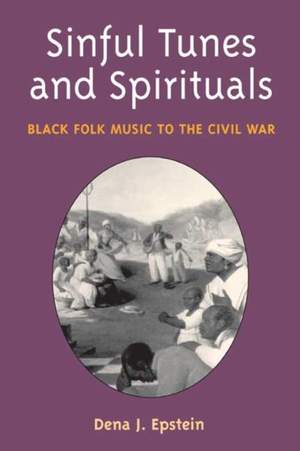Sinful Tunes and Spirituals: Black Folk Music to the Civil War
- Author: Epstein, Dena J.
Sinful Tunes ensures that we will never again be able to sing or listen to a spiritual in quite the same way. We can now see more clearly than ever before what has shaped it; we have been taken... — More…
Book
$39.50Contents
- Preface to the 2003 Paperback xiii
- Preface to the 1977 Edition xvii
- Prologue: The African Heritage and the Middle Passage 3
- Part One: Development of Black Folk Music to 1800 19
- 1. Early Reports of African Music in British and French America 21 La Calinda and the Banza 30
- Other African Dancing 38 2. More Black Instruments and Early White Reaction 47 Drums and Other African Instruments 47
- The Balafo 55
- Legal Restrictions on Instruments 58 3. The Role of Music in Daily Life 63 Funerals 63
- Pinkster and Other African Celebrations in the North 66
- Worksongs and Other Kinds of African Singing 68 4. The Acculturation of African Music in the New World 77 The Arrival of Africans and Their Music 78
- Acculaturation in New Orleans 90 5. Conversion to Christianity 100
- 6. Acculturated Black Musicians in the Thirteen Colonies 112 The African Jig, a Black-to-White Exchange 120 Part Two: Secular and Sacred Black Folk Music, 1800-1867 125
- 7. African Survivals 127 Persisting Musical and Cultural Patterns 128
- Black Music in New Orleans, 1820-67 132 8. Acculturated Dancing and Associated Instruments 139 Patting Juba 141
- Drums, Quills, Banjo, Bones, Triangle, Tambourine 144
- Fiddlers 147
- Instrumental Combinations 155 9. Worksongs 161 Field Work and Domestic Chores 161
- Industrial and Steamboat Workers 164
- Boat Songs 166
- Corn, Cane, and Other Harvest Songs 172
- Singing on the March 176
- Street Cries and Field Hollers 181 10. Distinctive Characteristics of Secular Black Folk Music 184 Whistling 184
- Improvisation 184
- Satire 187
- Style of Singing 188
- Other Secular Music 189 11. The Religious Background of Sacred Black Folk Music, 1801-67 191 Opposition to Religious Instruction of Slaves 192
- Camp Meetings 197
- Missions to the Slaves 199
- Black Religious Groups 202
- Opposition to Secular Music and Dancing 207 12. Distinctive Black Religious Music 217 Spirituals 217
- Attempts to Suppress Black Religious Singing 229
- The Shout 232
- Funerals 234 Part Three: The Emergence of Black Folk Music during the Civil War 239
- 13. Early Wartime Reports and the First Publication of a Spiritual with Its Music 241 14. The Port Royal Experiment 252 Historical Background 252
- Earliest Published Reports 256
- Wartime Publication of Song Texts and Music 260 15. Reports of Black Folk Music, 1863-67 274 Criticism of "This Barbaric Music" 274
- Recognition of a Distinctive Folk Music 275
- The Shout 278
- Worksongs 287
- Performance Style 290
- Introduction of "New" Songs by the Teachers 296 16. Slave Songs of the United States: Its Editors 303 William Francis Allen 304
- Charles Pickard Ware 310
- Lucy McKim Garrison 314 17. Slave Songs of the United States: Its Publication 321 The Contributors 321
- Problems of Notation 326
- Assembling the Collection 329
- Publication and Reception 331
- Conclusion 343
- Appendices 349 I. Musical Excerpts from the Manuscript Diaries of William Francis Allen 349
- II. Table of Sources for the Banjo, Chronologically Arranged 359
- III. Earliest Published Versions of "Go Down, Moses" 363
- Bibliography 374
- Index 416



